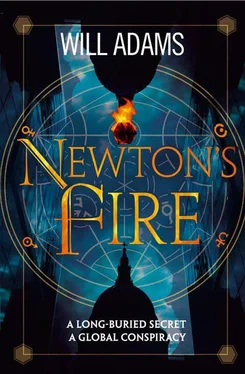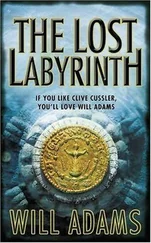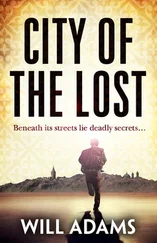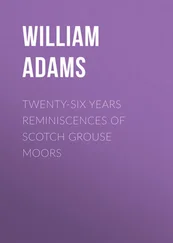Will Adams - Newton’s Fire
Здесь есть возможность читать онлайн «Will Adams - Newton’s Fire» — ознакомительный отрывок электронной книги совершенно бесплатно, а после прочтения отрывка купить полную версию. В некоторых случаях можно слушать аудио, скачать через торрент в формате fb2 и присутствует краткое содержание. Жанр: Триллер, на английском языке. Описание произведения, (предисловие) а так же отзывы посетителей доступны на портале библиотеки ЛибКат.
- Название:Newton’s Fire
- Автор:
- Жанр:
- Год:неизвестен
- ISBN:нет данных
- Рейтинг книги:5 / 5. Голосов: 1
-
Избранное:Добавить в избранное
- Отзывы:
-
Ваша оценка:
- 100
- 1
- 2
- 3
- 4
- 5
Newton’s Fire: краткое содержание, описание и аннотация
Предлагаем к чтению аннотацию, описание, краткое содержание или предисловие (зависит от того, что написал сам автор книги «Newton’s Fire»). Если вы не нашли необходимую информацию о книге — напишите в комментариях, мы постараемся отыскать её.
Newton’s Fire — читать онлайн ознакомительный отрывок
Ниже представлен текст книги, разбитый по страницам. Система сохранения места последней прочитанной страницы, позволяет с удобством читать онлайн бесплатно книгу «Newton’s Fire», без необходимости каждый раз заново искать на чём Вы остановились. Поставьте закладку, и сможете в любой момент перейти на страницу, на которой закончили чтение.
Интервал:
Закладка:
He turned to read the first letter of each line. ‘Balinus?’ he frowned.
She nodded. ‘It’s what the Harranians called Apollonius of Tyana.’
‘If that was meant to make things clearer for me,’ said Luke, ‘you might want to give it another shot.’
‘Apollonius was a Turkish holy man from the time of Jesus. We found a lot of his cult objects on my excavation in Antioch. And one of my colleagues from the dig is the authority on the guy.’
‘What’s his name doing here?’
‘The Harranians lived in Southern Turkey, right in the path of the Muslim Conquest. But they were allowed to continue with their own religion, which seems to have been almost alchemical in its nature. Their sacred texts were the Hermetica , which is how they survived until the Renaissance, and why Newton had to translate them from Arabic rather than Egyptian, Greek or Latin. And here’s the thing: they revered this Balinus or Apollonius guy for having saved the Emerald Tablet before them. He was one of their heroes.’
‘So our cabal decided to honour him too,’ said Luke. ‘But why use an acrostic? Why not just write his name?’
‘Because Apollonius was a very controversial figure, particularly among Christians. A male child whose birth was announced by heavenly beings, who embraced poverty and celibacy, who went everywhere barefoot and who refused to eat meat. A great moral teacher who healed the sick, raised the dead, cast out demons and predicted the future. Sentenced to death by the Romans but ascended into heaven instead.’
‘Apollonius?’
‘Which made him rather problematic for Christians preaching about the unique glories of Jesus,’ said Rachel. ‘Though I’m surprised to find that Newton was a fan. I always understood he was a devout Christian.’
‘He was,’ Luke assured her. ‘But a very idiosyncratic one. He believed in the teachings of Jesus, but he didn’t think him God. That was his great heresy. He loathed the doctrine of the Trinity, and therefore the Catholic church for foisting it on the world.’
‘What about these other guys?’
Luke shook his head. ‘All pretty conventional, as far as I know. But you had to be back then. Antitrinitarianism was a serious crime. At the very best, it would be the death of your professional and social life. No Antitrinitarian would ever have got to rebuild St Paul’s, for example.’
‘St Paul,’ muttered Rachel. ‘Yes, of course.’
‘Of course what?’
‘Here.’ She beckoned Luke around the other side of the plinth and crouched in front of the second inscription. ‘Apollonius wasn’t problematic for Christians just because of his similarities to Jesus. He was even closer to St Paul. The name Apollonius comes from Apollo, which is close enough to mistake for Paul. He was born in southern Turkey, about thirty miles north of Tarsus, where St Paul came from. And he studied in Tarsus himself throughout his teens. So essentially you have these two men with similar names, born at the same time and place, both growing up to become itinerant preachers famous for the letters on morals they wrote to the citizens of major Mediterranean cities. Both had encounters with wild animals in Ephesus. Both wrote about sacrifices and ritual. And both were Roman citizens who crossed emperors and were sentenced to death.’
‘You’re saying they were the same person?’
Rachel shrugged. ‘Plenty of people have thought so over the centuries. Maybe these guys did too. What do you think? Could they have believed in St Paul as Balinus, the secret alchemist who saved the Emerald Tablet?’
‘I can’t speak for them all,’ said Luke. ‘But Newton, sure. He didn’t think of the prophets as mystics inspired by divine revelation, like most people seem to. He thought of them as immensely intelligent and informed, masters not just of religion but also of mathematics, astronomy, alchemy and all the other disciplines of natural philosophy. So Moses, Enoch, Elijah, Hermes Trimegistus, Solomon and the rest were great alchemists by definition . That was what Newton aspired to for himself, so it would have made perfect sense to him that St Paul was the same. Especially as he was already a considerable figure among the alchemists.’
‘How so?’
‘You’ve heard of the Jesus myth, right? The idea that Jesus never even existed.’
‘What about it?’
‘A lot of that stems from St Paul, because he famously didn’t write much about Jesus the man, only about Christ the spiritual force. And he wrote something very peculiar in a letter to the Corinthians, about the followers of Moses drinking from the spiritual rock that followed them; and the rock was Christ. Some alchemists interpreted that to mean that Jesus somehow was the philosopher’s stone. Some even believed that if they found the philosopher’s stone they could precipitate the Second Coming.’
Rachel looked around at the faces on the walls. ‘What the hell were these guys trying to do?’
A dull buzzing noise sounded before Luke could answer. Dust motes shaken from the walls and ceiling began swirling in the lamplight. He looked bleakly upwards. ‘They’re drilling,’ he said. ‘They’re coming down through the floor.’
TWENTY-THREE
I
The drilling stopped for a minute or so, giving Luke and Rachel hope that they might have given it up. But then it returned even louder. The air grew thicker with dust, making them blink and cough. ‘We have to get away,’ said Luke.
‘What if they hear us?’
‘We can’t stay here.’
They headed back along the passage to the well, dismantled the wall. They couldn’t risk the bucket banging on the sides of the shaft, so Luke untied it from the rope, set it down behind him. It was dark above, the basement lights off. That was something. He climbed as quietly as he could, though the rope still creaked as it twisted. The drilling grew louder as he neared the top, giving him cover. He peered over the rim. No sign of anyone. He hauled himself out and beckoned to Rachel. She began to climb, slowly and steadily, swinging from wall to wall as-
A door opened abruptly. Luke barely had to time to warn Rachel and duck down behind the well. Footsteps hurried to and up the main staircase. Silence for a minute or so, then a toilet flushed and plumbing groaned. More footsteps on the stairs, then the gallery door opened and closed once more. All clear. He beckoned to Rachel, dangling patiently. She looked weary by the time she made it to the top. He helped her out, gave her a few moments rest. They took off their shoes and carried them to the stairs. The drilling paused for a few moments and they could hear talking. Then it started up again. They climbed the stairs. The whole museum was in darkness except for a few emergency lights. A man was looking out one of the ground-floor windows, his back to them. They continued up to the first floor. The fire escape door had a locking bar so that it could only be opened from inside. Luke pressed down on it, his heart in his mouth lest it trigger the alarm. It didn’t. A car passed by. Broad Street looked empty in its headlights. Luke slipped out onto the fire escape, held the door for Rachel. The locking bar clicked behind them. No going back now.
The wrought-iron steps were as cold as fear on Luke’s soles. They crept down to the bottom, pulled their shoes back on and walked briskly but openly, as though with nothing to hide. A left turn took them into relative darkness, then out onto a square. A police car ahead forced them to loop around so that it took them twenty-five minutes to reach Pelham’s BMW. They watched it for a while, saw no sign of ambush. Yet Luke felt anxious all the same. ‘Stay here,’ he whispered to Rachel.
Читать дальшеИнтервал:
Закладка:
Похожие книги на «Newton’s Fire»
Представляем Вашему вниманию похожие книги на «Newton’s Fire» списком для выбора. Мы отобрали схожую по названию и смыслу литературу в надежде предоставить читателям больше вариантов отыскать новые, интересные, ещё непрочитанные произведения.
Обсуждение, отзывы о книге «Newton’s Fire» и просто собственные мнения читателей. Оставьте ваши комментарии, напишите, что Вы думаете о произведении, его смысле или главных героях. Укажите что конкретно понравилось, а что нет, и почему Вы так считаете.












